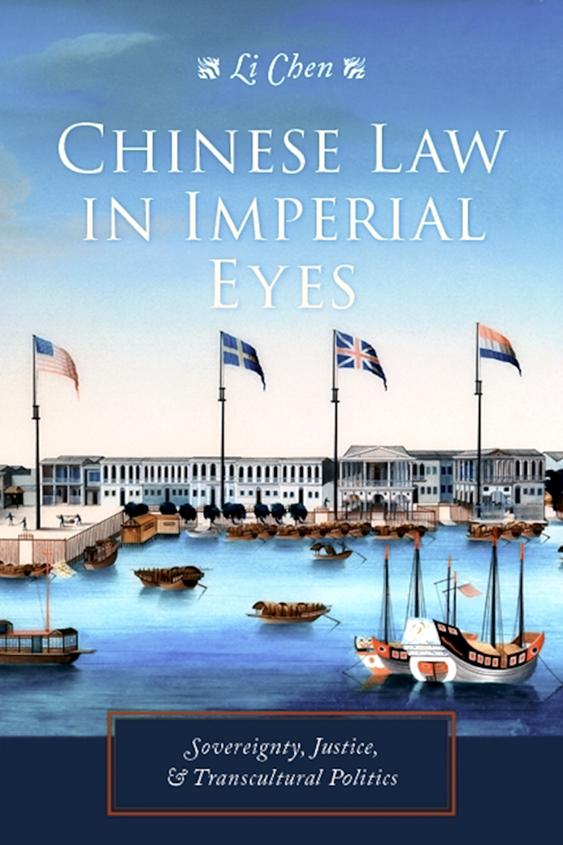A unique look at how Western views of China and Chinese law were influenced in the century leading up to the First Opium War (1839-1842) has earned a U of T Scarborough history professor a prestigious book prize.
Professor Li Chen has won one of the most prestigious awards in Chinese studies from the Association for Asian Studies (AAS) for his book Chinese Law in Imperial Eyes: Sovereignty, Justice and Transcultural Politics.
"It's certainly a great honour and a humbling experience for me to have the book recognized by the AAS," says Chen, Associate Professor of History and Global Asia Studies and Chair of the Department of Historical and Cultural Studies.
A historian of late Imperial and modern China and comparative law, Chen’s research focuses on better understanding the intersection of law, politics, and culture both in Chinese history and in an international and global context.
In Chinese Law in Imperial Eyes, Chen explores the power dynamics of Sino-Western relations during the formative century leading up to the First Opium War. He highlights the importance and centrality of law to modern imperial ideology and politics in China and argues that the shifting balance of global economic and political power to the West, formed and transformed knowledge of China and Chinese law in different contact zones.
Chen argues that recovering the varied and contradictory roles of Chinese law in Western "modernization" helps focus the subsequent Euro-Americentric discourse of global modernity through the eyes of China.
"This book was part of the collective effort of a growing number of scholars to re-situate the conversation about Chinese cultural, legal, social or economic traditions,” says Chen.
His book points to important yet often under-analyzed historical sites that played a role in defining and restructuring imperial sovereignty, national identity, cultural tradition, or international law and order. It shows how constructed differences between societies were first hardened into cultural or racial boundaries and then politicized to make sense of international conflicts and hierarchy.
"For more than two centuries, Chinese law and government were often depicted in Euro-America as arbitrary, barbaric, cruel, or irrational,” says Chen.
He adds that until very recently this has been the conventional wisdom among many commentators and it has been difficult for modern scholars to talk about Chinese law or legal culture on its own terms without being overburdened by these representations.
"This book was part of the collective effort of a growing number of scholars to re-situate the conversation about Chinese cultural, legal, social or economic traditions,” says Chen. “This was done by critically re-examining the different forces and socio-economic and political interests that produced and legitimated the above-mentioned representations of China and Chinese law."

The book draws on recent work in anthropology, cultural studies, critical legal studies, history of international law and empire, post-colonial theories, and Chinese history and Sino-Western relations. It also sheds new light on important topics such as the formation of comparative Chinese law in the West, the origins of the First Opium War and the application of foreign laws in China.
Chen, who is a current director and former president of the International Society for Chinese Law and History (ISCLH), began work on the book while completing his doctorate at Columbia University before joining the University of Toronto in 2008.
“It's not just for China historians or students of international relations," says Chen, who kept a diverse and interdisciplinary audience in mind when writing the book.
He’s also working on another book funded by the Social Sciences and Humanities Research Council (SSHRC) that runs almost parallel to the timeframe of his first book where he seeks to reinterpret the field of Chinese legal practice and knowledge production during the Qing dynasty (1644-1911).
Contrary to the once popular view that law played an unimportant or very limited role in late imperial China, his study shows that the legal realm and legal expertise were highly contested and crucial to the State and society in late imperial China.
READ AN EXCERPT OF CHINESE LAW IN IMPERIAL EYES
"This first book was primarily about how China and Chinese law were represented and reimagined in the Sino-Western contact zones," he says.
"The second book will be more focused on Chinese law from the perspectives of Chinese actors, such as Chinese officials and literati, legal specialists, and ordinary litigants, to see how the knowledge, discourse, and operation of the legal system shaped and were shaped by the country's politics, social practices, and economic activities.”
The AAS awards the Joseph Levenson Book Prizes to two English-language books (on the pre-1900 and the post-1900 periods respectively) that make the greatest contribution in increasing the understanding of history, culture, society, politics or the economy of China. Past award winners include some of the most influential scholars in the field of Chinese studies.
Chen will be presented with the $1,000 book prize award and a citation on March 23, during the AAS' annual conference in Washington, D.C.
